The Grapes of Wrath Blu-ray Movie
HomeThe Grapes of Wrath Blu-ray Movie 
20th Century Fox | 1940 | 130 min | Not rated | Jun 05, 2012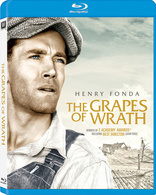
Movie rating
8.1 | / 10 |
Blu-ray rating
| Users | 0.0 | |
| Reviewer | 4.5 | |
| Overall | 4.5 |
Overview
The Grapes of Wrath (1940)
In the troubling times of the Great Depression the Joad family, accompanied by their friend Reverend Jim, migrate from Oklahoma to California in the hopes of finding work in a vineyard and improving their financial condition. But the road is long and rough, and when they reach their destination things aren't quite what they expected.
Starring: Henry Fonda, Jane Darwell, John Carradine, Charley Grapewin, Dorris BowdonDirector: John Ford
| Drama | Uncertain |
| Period | Uncertain |
Specifications
Video
Video codec: MPEG-4 AVC
Video resolution: 1080p
Aspect ratio: 1.33:1
Original aspect ratio: 1.37:1
Audio
English: DTS-HD Master Audio Mono (48kHz, 24-bit)
Spanish: Dolby Digital Mono
French: DTS-HD Master Audio Mono
Spanish: DTS-HD Master Audio Mono
German: DTS-HD Master Audio Mono (48kHz, 24-bit)
Italian: DTS-HD Master Audio Mono (48kHz, 24-bit)
Spanish: Dolby Digital=Latin American / DTS-HD MA=Castilian
Subtitles
English SDH, French, German, Italian, Japanese, Portuguese, Spanish, Danish, Dutch, Finnish, Norwegian, Swedish
Discs
50GB Blu-ray Disc
Single disc (1 BD)
Playback
Region free
Review
Rating summary
| Movie | 5.0 | |
| Video | 5.0 | |
| Audio | 4.5 | |
| Extras | 3.0 | |
| Overall | 4.5 |
The Grapes of Wrath Blu-ray Movie Review
Mine eyes have seen the glory of this film in true HD...
Reviewed by Casey Broadwater July 3, 2012For some, it's the Great American Novel, a multi-layered epic of family, social injustice, and westward expansion. For others—
the less literary minded, let's say—it has a reputation as that long-ass book I had to read in high school. But The
Grapes of Wrath, John Steinbeck's elegiac 1939 novel, has always been divisive. Upon its release, the book—
about evicted Okie sharecroppers struggling to make a new life in California—was banned and burned and derided as "red"
propaganda. In those days, as today, it was considered suspect to overtly sympathize with the plight of the poor. However, it
was also an immediate best-seller, widely read and discussed from coast to coast.
A film adaptation was inevitable, and it came quickly. 20th Century Fox producer Daryl F. Zanuck bought the rights, Nunnally
Johnson dashed out a script, and only a few months after the novel was published, the screen adaptation was placed in the
hands of director John Ford, who was recently responsible for the reinvigoration of the western with his 1939 film,
Stagecoach. Though some have called it strange that a noted right-wing filmmaker would take on such a left-leaning
story, Ford was not yet the Nixon-voting, Vietnam War-supporting Republican he'd eventually become. Politics aside, The
Grapes of Wrath fits perfectly in Ford's body of work; it's something of a contemporary western, following a tight-knit
clan making their way through unfamiliar and hostile territory, hounded not by bandits or warring natives but by wealthy
landowners, crooked cops, and unwelcoming locals.
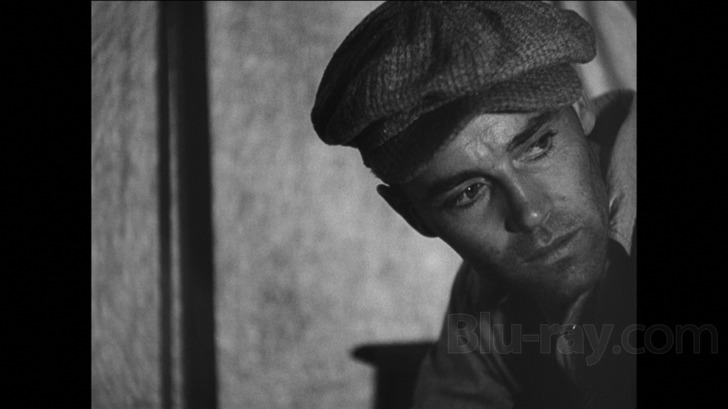
Tom Joad
The plot should be familiar, but for those who dozed through A.P. English, a quick recap: The Grapes of Wrath is the story of the Joad family, Oklahoma tenant farmers kicked off their land like so many others during the 1930s, when a potent combo of dust-bowl droughts, economic downturn, and industrialization—why pay ten men to do what one guy on a tractor can do in the same time?—led landowners and banks to give sharecroppers the boot.
The film begins with wayward son Tom Joad—Henry Fonda, in one of his best-ever performances—returning home after four years in prison for a partially accidental homicide. On his way, he meets up with down-and-out ex-preacher Jim Casy (John Carradine), who "lost the Spirit" but who will eventually—and I think the statute of limitations is up on this spoiler—become an ironically Christ-like martyr for the cause of unionization. After a run-in with a neighbor who explains why all the local farmers are leaving—in a beautiful scene lit by candlelight—Tom and Casy find the other Joads packing up a truck and preparing to venture westward. We see Ma Joad—a stalwart, empathetic Jane Darwell—sadly burning the treasured possessions she's unable to pack, and meet Tom's pregnant sister "Rosasharn" (Dorris Bowdon) and her husband Connie (Eddie Quillan), who has bigger ambitions than being a fruit-picker. All told, about a dozen pile into and onto the precariously loaded truck, including sickly grandma and grandpa, and Tom's emasculated Pa (Russell Simpson), who cedes all control of the family to his wife.
Like the novel, the film details the hardships on Route 66—deaths, desertions, and ill-treatment—as the family pins their hope on the promise made in a widely distributed leaflet: "800 Pickers Wanted." They naively assume work will be plentiful and, of course, it isn't. Central California is flooded with similar drifters, and the Joads end up on the outskirts of an unfriendly town, in a migrant slum camp populated by the starving and disillusioned. "Sure don't look none too prosperous," says Tom. Later, when they finally get work up north, they don't initially realize they've been hired as scabs to replace striking pickers fighting for a fair wage. Tom is drawn into the labor dispute and commits himself to reform in a haunting speech—one of Hollywood's greats—that's taken nearly word-for-word from the book: "I'll be all around in the dark. I'll be everywhere. Wherever you can look, wherever there's a fight, so hungry people can eat, I'll be there. Wherever there's a cop beatin' up a guy, I'll be there. I'll be in the way guys yell when they're mad. I'll be in the way kids laugh when they're hungry and they know supper's ready, and when the people are eatin' the stuff they raise and livin' in the houses they build, I'll be there, too."
Working with cinematographer Gregg Tolland—who would shoot Citizen Kane the following year—Ford gives The Grapes of Wrath a documentary-like realism that's nevertheless poetic, echoing the humanizing photojournalism of Dorothea Lange, whose stills put literal faces to the abstract hardship of the Great Depression. Knowing the film would almost certainly meet charges of exaggeration—and in order to be as accurate as possible—producer Zanuck even sent investigators out to real itinerant worker camps to gather evidence about their conditions. In one sense, the film and the novel are inherently didactic; both attempt to raise social consciousness about unfair farming practices and the exploitation of the poor. But the story also operates on a deeper level, making an American myth of the suffering of the Joads, whose family name is a clear spin on the biblical Job, who likewise faced hardships but endured without bitterness. "We're the people that live," says Ma in summary. "They can't wipe us out, they can't lick us. We'll go on forever, Pa, cos we're the people."
If the film has one dramatic shortcoming, it's that it swaps out the book's admittedly too-bleak-for-1940s-Hollywood ending— with a malnourished Rosasharn breastfeeding a starving old man after her own baby is stillborn—for a far more optimistic conclusion in a peaceful government-run camp that meets all of the Joads' needs. This slight whitewashing aside, John Ford's take on The Grapes of Wrath is stirringly powerful and certainly represents one of the highest peaks of pre-war American filmmaking.
The Grapes of Wrath Blu-ray Movie, Video Quality 
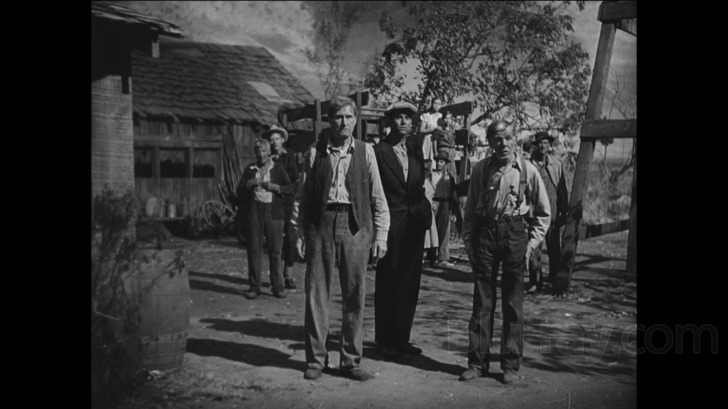
The Grapes of Wrath's 1080p/AVC-encoded transfer is simply one of the best black and white Blu-ray presentations I've seen so far this year. For starters, the 72-year-old print is in nearly immaculate condition. No scratches. No tears. No brightness flickering. Even tiny white specks are few and far between. Whether this is the result of careful restoration or a preternaturally clean negative, I'm not sure, but either way the film looks wonderful. The natural qualities of the 35mm picture have been preserved too, with a tight, untouched grain structure and no evidence of DNR or edge enhancement. No compression issues either. Clarity is substantially improved from prior releases, and you get a far better sense that you're seeing the film as it was meant to be seen. Facial features, clothing textures, the details of the Joad's heavily loaded truck— everything is more finely resolved. The tonality of Gregg Toland's masterful black and white cinematography is reproduced perfectly as well. The film has several scenes where a single light source illuminates an otherwise intense darkness, and the chiaroscuro contrast here is spot on, with deep but never detail-crushing blacks and highlights that are bright without peaking. Feel confident trading in that old DVD; The Grapes of Wrath has never looked better.
The Grapes of Wrath Blu-ray Movie, Audio Quality 
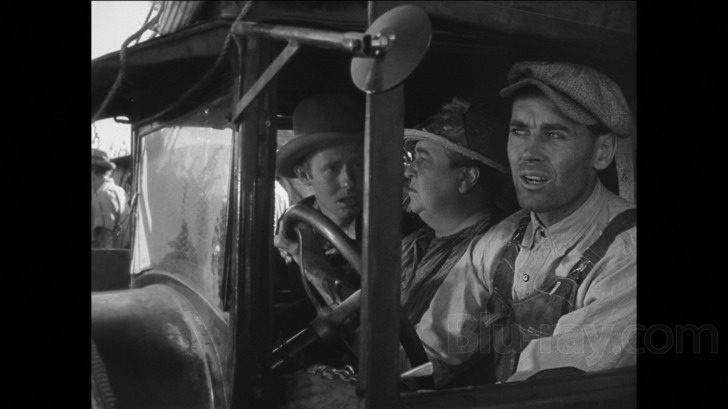
The film's lossless DTS-HD Master Audio mono track might not be as immediately impressive as the picture, but for a film from the early 1940s, the sound quality is fantastic. You expect a certain degree of tinniness from older films, but that just isn't present here. The mix has a full, grounded sound, with no brittleness in the high end. Neither are there any distracting splice pops, crackles, or dropouts; everything—from the effects to the characters' conversations—is cleanly recorded and nicely balanced. Between Eddie Quillan singing "Going Down the Road Feeling Bad," the strategic use of Ella Fitzgerald's "A Tisket, A Tasket," and Alfred Newman's tender orchestral score—which reworks the old folk tune "Red River Valley" as its central motif— music is extremely important to the film's mood, and it all sounds great here. Dialogue is always easily understood, but for that might need or want them, the disc includes several subtitle options, which appear in bright white lettering, and a number of dubs.
The Grapes of Wrath Blu-ray Movie, Special Features and Extras 
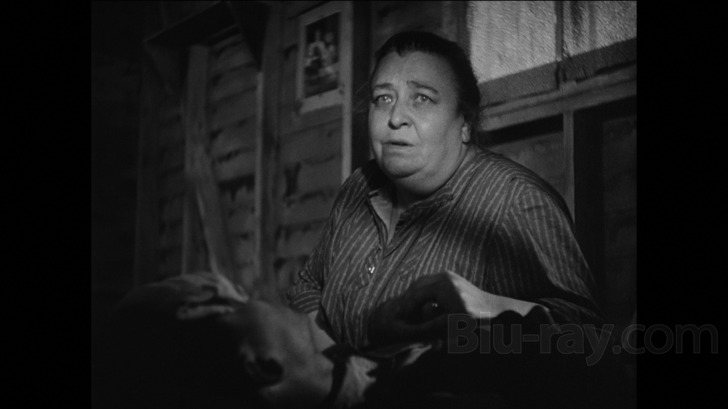
The Blu-ray ports over all the extras from the 2004 DVD, and also includes—via seamless branching—a U.K. version of the film that's identical except for an introductory prologue that sets the scene for Brits unfamiliar with the Dust Bowl.
- Audio Commentary: Film scholar Joseph McBride and Steinbeck expert Susan Shillinglaw give a detailed analysis of the film, with historical context, comparisons to the novel, and insight into the film's production. An excellent listen.
- Fox Movie Channel Presents Fox Legacy with Tom Rothman (SD, 24:37): Fox film exec Tom Rothman gives a history of the novel, the film, the Great Depression in general, and the parallels to the 2008 recession.
- Biography: Darryl F. Zanuck, 20th Century Filmmaker (SD, 45:03): An A&E special chronicling Zanuck's Hollywood career.
- Fox Movietone News (SD, 8:45): Five news reels documenting the dust bowl, the depression, and The Grapes of Wrath's appearance at the Academy Awards.
- Theatrical Trailer (1080p, 2:25)
The Grapes of Wrath Blu-ray Movie, Overall Score and Recommendation 
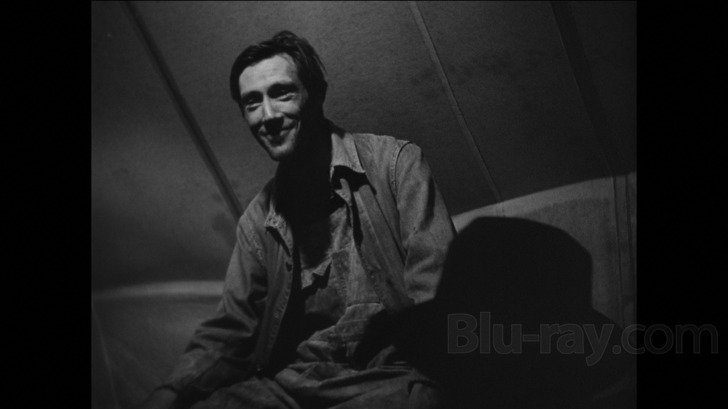
One of the best American films of the 1940s, John Ford's The Grapes of Wrath is many things—an almost biblical American myth of westward expansion, an epic road journey about family and survival, and a plea for compassion and social justice. It's also strikingly relevant to our own times, making it eminently worth revisiting now. This new Blu-ray edition is basically a straight port of the 2004 DVD—with all of the special features intact—but the drastic increase in picture quality and the addition of lossless audio make for an all-around upgrade-worthy release. This is a film that belongs in every classic movie lover's collection. Highly recommended!
Similar titles
Similar titles you might also like

Modern Times
1936

Blonde Venus
1932

Little Caesar
1931

American Violet
2008

American Pastoral
2016

Good
2008

Scarecrow
1973

Tommaso
2019

A Perfect World
1993

Mr. Smith Goes to Washington
1939

Thieves Like Us 4K
Standard Edition
1974

Ned Rifle
2015

The Grand Budapest Hotel
2014

Thelma & Louise 4K
1991

The Whole Town's Talking
Limited Edition to 3000
1935

The Red Menace
1949

The Pace That Kills
The Cocaine Fiends
1935

Punishment Park
1971

Hunger
2008

The Last Detail 4K
Shout Select
1973